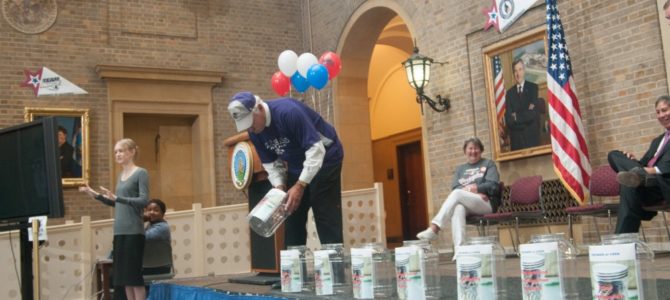
Most Americans believe they have a right to privately support the causes they believe in without harassment. The South Dakota legislature has a chance to affirm that belief this legislative session. If two important bills pass, South Dakota would be positioned as a leader nationally in philanthropic protections, just as it is already a leader in trust protections.
Gov. Kristi Noem’s support of these efforts underscores the importance of South Dakota’s charitable giving environment. While political opponents are taking aim at the governor, claiming it’s bad to allow people to keep their giving private, the bills actually protect citizens’ First Amendment right to give privately to whatever causes they choose without fear of political retaliation.
Private giving stands as one of the most fundamental and enduring traditions in American society. In times of plenty or times of lack, Americans tap their personal wealth, whether great or small, to support causes that improve the lives of others, their communities, the environment, and the world. In giving, people get to exercise a right with benefits far beyond themselves.
States value the role charity plays in providing for the basic needs of its residents, expanding education and opportunities for the less fortunate, enriching communities, and preserving the environment for the next generation. Increasingly, they seek to protect charitable organizations from burdensome, unnecessary, and even costly government mandates.
South Dakota enjoys a strong economy and reasonable regulatory landscape. Cato Institute ranked the state No. 6 in the nation for overall personal and economic freedom several years ago.
It also is a great place for philanthropy. South Dakota is home to 159 foundations that gave nearly $55 million to charities in 2015.
These gifts support the thousands of charities across the state that deliver vital services, pursue solutions to social problems from homelessness to addiction, and contribute to the vibrancy of the community. As with other states, individual donors and foundations were generous in the wake of the coronavirus outbreak while maintaining their other commitments.
Every dollar of a charitable gift is important. When foundations and trusts are asked to comply with increased reporting mandates, that leaves fewer dollars for charities and those they serve. Charitable organizations increasingly face calls to disclose more details about their operations, governance, and grantmaking that do not improve organizational effectiveness. However, these disclosures do increase operational and compliance costs such as legal fees, staff time, and other costs.
House Bill 1079 would allow South Dakota foundations to focus on advancing their mission rather than fighting more red tape. This bill prevents any executive, bureau, board, or state officer from forcing new filing or reporting requirements that are more restrictive or expansive than what is already on the books.
The bill exempts fraud and misuse to maintain proper oversight of the charitable sector. Too often partisan officials use their power to force organizations to comply with mandates that the legislature did not approve. This bill would guard against while leaving in place current requirements.
Increased compliance costs are one matter. More alarming is the chilling effect on giving that new disclosure mandates may trigger.
In states across the country, including California, New York, and Massachusetts, politicians have increasingly demanded that charities and nonprofit organizations reveal the names and addresses of top supporters and donors. Such information is highly sensitive and should be kept confidential.
In some instances, bureaucrats’ failure to protect donors led to information being posted online, opening donors to harassment, retaliation, and even death threats. The U.S. Supreme Court has agreed to decide whether California can compel organizations like Americans for Prosperity Foundation (AFPF) to disclose private information about top donors.
The other bill for consideration in South Dakota, Senate Bill 103, would prohibit public agencies from disclosing or releasing personal information about membership, volunteers, and financial and nonfinancial donors to 501(c) non-profit organizations, except as required by law. This measure would uphold the First Amendment rights of association for all South Dakota citizens regardless of the causes they choose to support.
If Americans fear their names may appear publicly without their consent as supporting a cause that is considered controversial or unpopular, they may choose not to give at all. The Supreme Court agreed on this six decades ago in the landmark NAACP v. Alabama case. The court sided with the storied civil rights organization whose members faced significant economic reprisal, violent threats, and public hostility because the state sought the identities of its members.
For politically motivated bureaucrats, chilling donations to causes they oppose may be the goal, but nonprofits of all kinds would end up starved of critical funds. The civil rights, women’s suffrage, and LGBTQ movements have all benefitted from the right of supporters to remain private. If disclosure laws were in place, the organizations that drove these movements might not have survived.
South Dakota’s philanthropic organizations should not be saddled with onerous and unlawful mandates that divert resources away from supporting charities and the people they serve. Donors to charities in the state should also not fear that their next gift could open them up to retribution.
Noem is a champion for donor privacy, and her support of these bills demonstrates her commitment to the freedom to give in this state. These efforts will ensure that the charitable sector in South Dakota is operating at its full potential, not encumbered by overregulation or starved by political animus.









